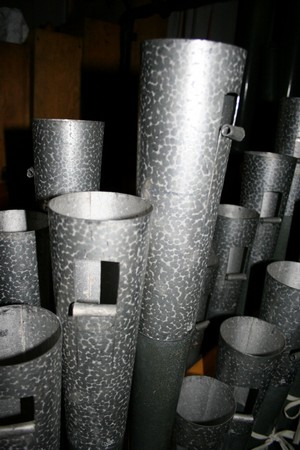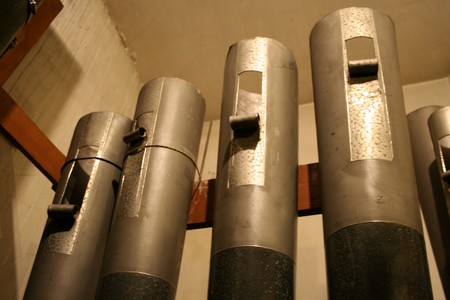| Ohio Theatre Robert Morton organ home | Organ Overview | Organ Photos | Organ Specifications | Organ Events | Articles of Interest | Links to Related Pages | E-mail the webmaster |
4/34 Robert Morton Organ
Ohio Theatre - Columbus, OH
Solo Chamber
16' Diaphonic Diapason and 16' Tuba Mirabilis
The 16' Diaphonic Diapason and 16' Tuba Mirabilis ranks represent two of the largest and loudest sets of pipes in the organ. While the Tuba Mirabilis rank can be found in both theater and classical organs, the Diaphonic Diapason is almost exclusively found in theater organs.
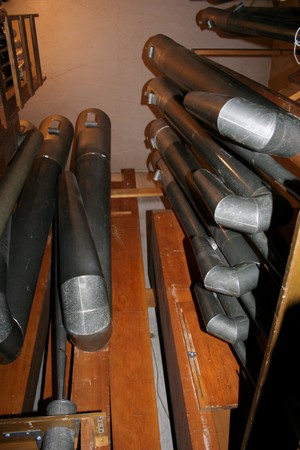
The 16' Diaphonic Diapason rank is a mixture of wood and metal pipes. The lowest 12 notes are wood and everything else is metal. Some of the wood pipes of this rank can be seen in the photo to the right. In addition, the lowest four notes are mitered pipes. The in the center of the photo on the right is the longest unmitered wood pipe (pitch EEE), and the first mitered pipe (pitch DDD#).
The largest pipes of the 16' Tuba Mirabilis (metal pipes in the photo) are also mitered in order to fit in the chamber. The largest pipe of the rank is just left of center (pitch CCC). These pipes are secured to a piece of wood towards the top of the pipe using metal straps.
Both of these ranks require a lot of air in order to get them to speak at the volume needed to blend with the rest of the organ. The lowest 12 notes of both ranks are on 20" of wind pressure. By comparison most church organs are rarely over 5" of wind pressure, even on the pedal pipes.
Below are three photos of the wood 16' Diaphonic Diapason pipes. The massive size and mitering of these pipes is illustrated in the left photo. Also note the humidity control in the left photo. Each chamber is temperature and humidity controlled in order to keep as constant climate environment as possible. This helps to keep the pipes in tune. The front of each pipe is stamped with its pitch as can be seen in the middle and right photos. These photos also illustrate how tight things are in the chamber.
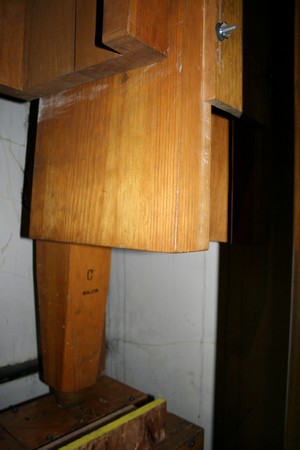
Tucked away in the front corner of the chamber is the largest pipe of the 16' Diaphonic Diapason rank, pitch CCC. Getting back to it requires maneuvering around the two tower bells on the organ.
Due to the pipe's overall length, mitering the pipe requires it to almost fold over itself. Also visible on the pipe is the bottom of the tuning slide. Loosening the wing nut visible at the top allows the tuning slide to be adjusted. Just left of this pipe is the CCC# pipe.
The mitering of the Tuba Mirabilis pipes is very interesting to look at first hand. Compare these pipes with the mitered 8' Trompette rank pipes on this organ. The center photo has a couple noteworthy items. First, the vertical wood on the left is the ladder used to climb the levels of pipes. Counting ground level, there are three levels of pipes in this chamber. Also, note the light gray air supply pipe next to the ladder.
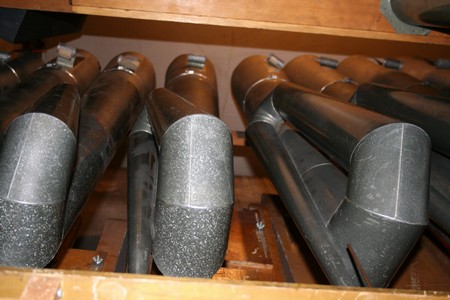 |
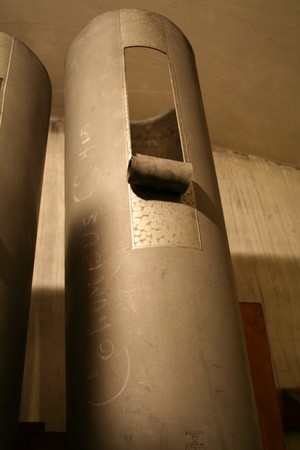
Written on the largest Tuba Mirabilis pipe is "Columbus Ohio". From a distance it looks like it is written in the dust, but a closer inspection reveals it is written in chalk. Other pipes in the organ also have "Columbus" written on them and in a similar style of handwriting. Thus it is entirely possible that this was written by someone at the Robert Morton factory. Neat to see it has lasted so many years.
